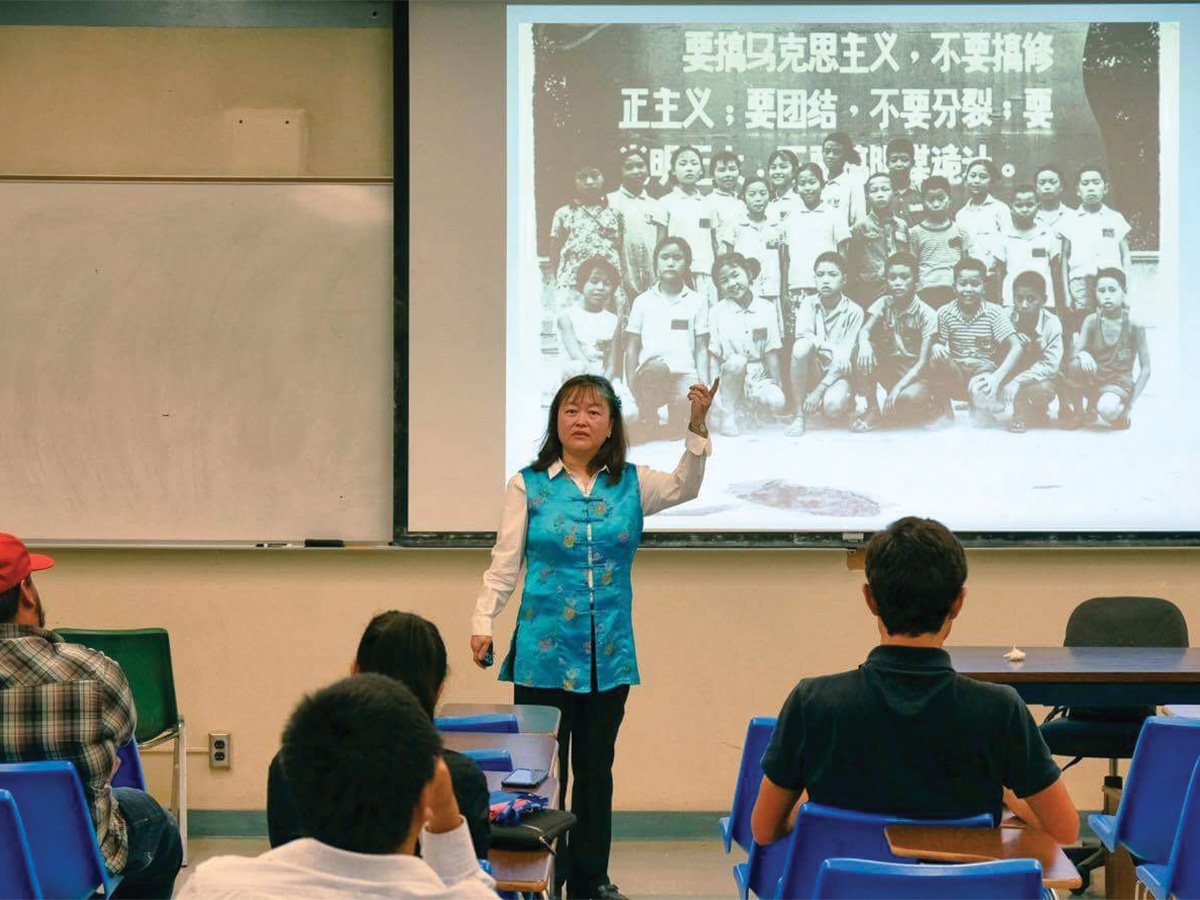
From 7:30 p.m. to nearly 10:15 p.m. on Wednesday, May 3 in 2200 Spieth Hall, Young Americans for Liberty (YAL), co-sponsored by UCR College Republicans and the Victims of Communism Memorial Foundation, hosted Lily Tang, the 2016 Libertarian nominee for U.S. Senate in Colorado. In the event titled “Lily Tang: My journey to freedom,” Tang spoke about her life in Mao’s Communist China.
The event drew about 30 attendees, including a family with two young children who drove more than two hours to see Tang. Tang narrated a slideshow of images portraying events from her youth, explaining how the political environment under Mao’s reign from 1949-1976 impacted her and her family.
After a short introduction by YAL President Joseph Gomez, and brief announcements by Vice President of the UCR College Republicans Jorge Flores, Tang began by describing her early upbringing. Born in Chengdu, Sichuan Province in southwest China two years before Mao’s Cultural Revolution began, her parents worked in factories six days a week. They were given small rations for foods like sugar, wheat, rice and two pounds of pork a month for a family of five with eight families sharing one bathroom in their government-provided community housing.
Tang desired as a school-aged child to be inducted into Mao’s Young Pioneers, an organization for elementary school students, where they taught you it was “your honor, privilege, you have to be a red class family.” She spoke of the Five Red Categories which were a way of creating a class distinction primarily based on birth. “My parents were red class because we’re not landowners, property owners,” said Tang, going on to share that her father was an orphan later adopted by his uncle to work on his farm.
She chronicled her path to the Young Pioneers, explaining that she was one of the best students and that she was very confident, “I told my girlfriend, ‘I bet I will be the first one to join Young Pioneers,’ and she told my teacher. My teacher called me into her office, ‘I’m not going to allow you to join Young Pioneers, why? Because you are full of yourself, you are too confident … Why can’t you be like everybody else and be humble?’” She later shared that she learned how to “conform to a collective society, I need(ed) to hide my true personality, my true colors of self confidence.”
She then showed a picture of her elementary school teachers, pointing out one teacher who taught “political correctness, she’s called a political counselor, that’s her job!” She explained that if a family or student was not in line with party beliefs, they would be reported to the political counselor who “had all the power.” Tang was afraid of being reported to the political counselor so she conformed, and one year later was finally inducted into the Young Pioneers.
While speaking of the sociopolitical upheavals characteristic of Mao’s dictatorship, Tang showed a picture of the president of Beijing University paraded as a pariah by the student paramilitary group Red Guard and put under house arrest when accused of being a “stinking intellectual.” She described the belief that “the only love you are allowed to express publicly is you love, in a collective sense, you love your country, you love your community, you love Mao, you love (the) party.” She stated that you were not allowed to publicly show love for your family, citing an oft-repeated song lyric, “father and mother are dear, but dearer still is Chairman Mao”
She also told the story of her uncle’s generation who was forced under government mandate to get “reeducated by peasants.” Her grandmother’s three sons were sent to the countryside only allowing the youngest child to stay in the household. He was sent to a tea farm where he worked for 12 years saying that “we were used, we didn’t come back to the cities … the young people were used to silence others,” speaking of the students in the Red Guard “but later they were silenced by the government.” Only after the young men threatened to commit suicide on the railroad tracks did they allow the students to come home and work their parents’ job.
Tang graduated high school in 1981 and went to law school in Shanghai, being selected as a faculty member upon her graduation. During her time in law school, she interacted with several foreigners, meeting “one American that changed my life, he showed me a constitution in his dormitory … I had never heard about this concept in my entire life … each human being has natural rights given to you by your creator, not by your government. I thought Chairman Mao gave me everything … No, I’m supposed to have those natural rights.” She did more research on the U.S. in secret, learning about “separation of powers, limited government, all those freedoms … I thought ‘this country is so cool, someday I have to leave China.’”
She became a law school faculty member, describing how the party oversaw everything, a prime example being how she was forced to take political studies courses and join the Communist party. “The law, according to the theory … you would think laws protect the people and property … No, in China, our first day of class, the law is a tool for the government to use to govern the masses, you are not an individual, you are just masses.”
Tang decided that she could not stay in China and was accepted by the University of Texas, Austin as a graduate student to study social work. With her boss’s permission and $100 in her pocket borrowed from friends, she moved to the U.S. in 1988 saying, “I made it, I got out.”
After an intermission where pizza and drinks were served, an hour-long Q-and-A followed, discussing various political issues and why she became a Libertarian.








